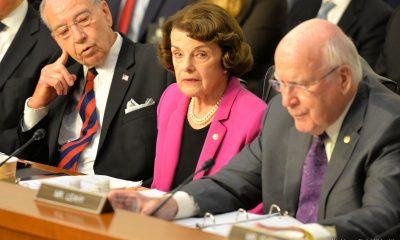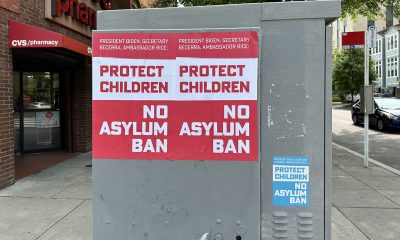National
Deportations on hold for foreigners in same-sex marriages
News follows Obama’s determination that DOMA is unconstitutional
An agency within the Department of Homeland Security has put on hold deportation cases for foreign nationals who are in same-sex marriages with American citizens and seeking green cards for U.S. citizenship.
In a statement, Chris Bentley, a spokesperson for U.S. Citizenship and Immigration Services, confirmed on Monday that such cases have put on abeyance until the Department of Homeland Security receives further legal guidance on handling them.
“USCIS has issued guidance to the field asking that related cases be held in abeyance while awaiting final guidance related to distinct issues,” Bentley said.
Last week, Newsweek reported that the heads of two USCIS districts in D.C. and Baltimore had informed lawyers for the American Immigration Lawyers Association that cases in their districts involving married gay and lesbian couples would be put on hold.
A DHS official, who spoke on condition of anonymity, said the abeyance follows President Obama’s determination in February that the Defense of Marriage Act, which prohibits federal recognition of same-sex marriage, is unconstitutional and the U.S. Justice Department announcement that it would no longer defense the anti-gay statute against litigation in court.
Because of DOMA, American citizens who are married to foreign spouses of the same gender cannot sponsor their spouses for U.S. citizenship — even if the couple lives in a state or jurisdiction that recognizes same-sex marriage.
Despite the new guidance, Bentley maintained USCIS hasn’t issued any change in policy and intends to continue enforcement of DOMA.
“USCIS has not implemented any change in policy and intends to follow the President’s directive to continue enforcing the law,” Bentley said.
Asked what the possible outcomes could be for the upcoming legal guidance, the DHS official replied, “All I can say is that the department’s policy direction is set by the president, but as a matter of policy we don’t comment on legal guidance until it’s final.”
The final legal guidance on the issue is expected to come down from the Department of Homeland Security’s general counsel. The DHS official said he’s hoping the guidance will be issued “imminently,” but doesn’t have a more specific time.
Steve Ralls, spokesperson for Immigration Equality, said the abeyance means that green cards applications that American citizens make for foreign same-sex spouses will be in “pending status” until the courts make a final determination on DOMA’s constitutionality.
“So they will not be denied, and while they are pending, the spouses of those that have applied for sponsorship will be able to remain in the thread, so it essentially stops the removal of anyone who has a pending application until the courts have settled the issue of DOMA’s constitutionality,” Ralls said. “It’s a temporary fix, but it’s a temporary fix that will remain in place until DOMA has made its way through the court system.”
In a statement, Rachel Tiven, executive director for Immigration Equality, called the new guidance “terrific news and a significant step forward for the families we work with.”
Earlier this month, Immigration Equality sent letters to the Justice Department and the Department of Homeland Security asking that the Obama administration put on hold the appeals of immigrant visa petitions filed by American citizens on behalf of their same-sex spouses.
“At last, after nearly two decades of work and 10,000 — and counting — couples reaching out to our legal team for help, we hope today’s news is a sign that relief is, indeed, on the way,” Tiven said.
Tiven advised couples who think they may be impacted by the announcement to contact Immigration Equality for free legal counsel on what steps would be appropriate for them.
Ralls added the number of couples who will benefit from the abeyance will in the end depend on the breadth of the ruling from the courts on DOMA.
“So it depends on whether the courts decide that both federal and state DOMAs are unconstitutional or whether just the federal DOMA is unconstitutional, so there are sort of a wide variety of possibilities in terms of who the final resolution will benefit,” Ralls said.
If the federal DOMA is struck down, Ralls noted that married bi-national same-sex couples would have the option of moving to jurisdictions that recognize marriage equality to remain together in the United States.
Christopher Nugent, who’s gay and co-chair of the American Bar Association’s rights of immigrants committee, called the news a “positive development to protect couples from unduly separated through deportation,” but said questions linger on how the immigration courts will handle the news guidance.
“For example, if somebody has already been ordered removed and then marries a U.S. citizen, is the immigration court going to grant a motion to reopen?” Nugent said.
One couple that the USCIS move could benefit is Edwin Blesch, an American citizen, and Tim Smulian, his South African spouse. The couple resides in New York state, where their marriage from South Africa is recognized by the state government. Last week, Immigration Equality filed a green card application on behalf the couple.
“Every day, we live with the very real possibility that, despite following every law and every policy of the United States, Tim will be forced to leave the country, and I will be left without my caretaker and the love of my life,” Blesch said in a statement. “Today’s news gives us great relief, and great hope that we may soon be able to put that worry behind us. For the first time, we can begin to plan the rest of our lives together without fear that we will be torn apart.”
Pennsylvania
Malcolm Kenyatta could become the first LGBTQ statewide elected official in Pa.
State lawmaker a prominent Biden-Harris 2024 reelection campaign surrogate

Following his win in the Democratic primary contest on Wednesday, Pennsylvania state Rep. Malcolm Kenyatta, who is running for auditor general, is positioned to potentially become the first openly LGBTQ elected official serving the commonwealth.
In a statement celebrating his victory, LGBTQ+ Victory Fund President Annise Parker said, “Pennsylvanians trust Malcolm Kenyatta to be their watchdog as auditor general because that’s exactly what he’s been as a legislator.”
“LGBTQ+ Victory Fund is all in for Malcolm, because we know he has the experience to win this race and carry on his fight for students, seniors and workers as Pennsylvania’s auditor general,” she said.
Parker added, “LGBTQ+ Americans are severely underrepresented in public office and the numbers are even worse for Black LGBTQ+ representation. I look forward to doing everything I can to mobilize LGBTQ+ Pennsylvanians and our allies to get out and vote for Malcolm this November so we can make history.”
In April 2023, Kenyatta was appointed by the White House to serve as director of the Presidential Advisory Commission on Advancing Educational Equity, Excellence and Economic Opportunity for Black Americans.
He has been an active surrogate in the Biden-Harris 2024 reelection campaign.
The White House
White House debuts action plan targeting pollutants in drinking water
Same-sex couples face higher risk from environmental hazards

Headlining an Earth Day event in Northern Virginia’s Prince William Forest on Monday, President Joe Biden announced the disbursement of $7 billion in new grants for solar projects and warned of his Republican opponent’s plans to roll back the progress his administration has made toward addressing the harms of climate change.
The administration has led more than 500 programs geared toward communities most impacted by health and safety hazards like pollution and extreme weather events.
In a statement to the Washington Blade on Wednesday, Brenda Mallory, chair of the White House Council on Environmental Quality, said, “President Biden is leading the most ambitious climate, conservation, and environmental justice agenda in history — and that means working toward a future where all people can breathe clean air, drink clean water, and live in a healthy community.”
“This Earth Week, the Biden-Harris Administration announced $7 billion in solar energy projects for over 900,000 households in disadvantaged communities while creating hundreds of thousands of clean energy jobs, which are being made more accessible by the American Climate Corps,” she said. “President Biden is delivering on his promise to help protect all communities from the impacts of climate change — including the LGBTQI+ community — and that we leave no community behind as we build an equitable and inclusive clean energy economy for all.”
Recent milestones in the administration’s climate policies include the U.S. Environmental Protection Agency’s issuance on April 10 of legally enforceable standard for detecting and treating drinking water contaminated with polyfluoroalkyl substances.
“This rule sets health safeguards and will require public water systems to monitor and reduce the levels of PFAS in our nation’s drinking water, and notify the public of any exceedances of those levels,” according to a White House fact sheet. “The rule sets drinking water limits for five individual PFAS, including the most frequently found PFOA and PFOS.”
The move is expected to protect 100 million Americans from exposure to the “forever chemicals,” which have been linked to severe health problems including cancers, liver and heart damage, and developmental impacts in children.
An interactive dashboard from the United States Geological Survey shows the concentrations of polyfluoroalkyl substances in tapwater are highest in urban areas with dense populations, including cities like New York and Los Angeles.
During Biden’s tenure, the federal government has launched more than 500 programs that are geared toward investing in the communities most impacted by climate change, whether the harms may arise from chemical pollutants, extreme weather events, or other causes.
New research by the Williams Institute at the UCLA School of Law found that because LGBTQ Americans are likelier to live in coastal areas and densely populated cities, households with same-sex couples are likelier to experience the adverse effects of climate change.
The report notes that previous research, including a study that used “national Census data on same-sex households by census tract combined with data on hazardous air pollutants (HAPs) from the National Air Toxics Assessment” to model “the relationship between same-sex households and risk of cancer and respiratory illness” found “that higher prevalence of same-sex households is associated with higher risks for these diseases.”
“Climate change action plans at federal, state, and local levels, including disaster preparedness, response, and recovery plans, must be inclusive and address the specific needs and vulnerabilities facing LGBT people,” the Williams Institute wrote.
With respect to polyfluoroalkyl substances, the EPA’s adoption of new standards follows other federal actions undertaken during the Biden-Harris administration to protect firefighters and healthcare workers, test for and clean up pollution, and phase out or reduce use of the chemicals in fire suppressants, food packaging, and federal procurement.
Maine
Maine governor signs transgender, abortion sanctuary bill into law
Bomb threats made against lawmakers before measure’s passage

BY ERIN REED | On Tuesday, Maine Gov. Janet Mills signed LD 227, a sanctuary bill that protects transgender and abortion providers and patients from out-of-state prosecution, into law.
With this action, Maine becomes the 16th state to explicitly protect trans and abortion care in state law from prosecution. This follows several bomb threats targeting state legislators after social media attacks from far-right anti-trans influencers such as Riley Gaines and Chaya Raichik of Libs of TikTok.
An earlier version of the bill failed in committee after similar attacks in January. Undeterred, Democrats reconvened and added additional protections to the bill before it was passed into law.
The law is extensive. It asserts that gender-affirming care and reproductive health care are “legal rights” in Maine. It states that criminal and civil actions against providers and patients are not enforceable if the provision or access to that care occurred within Maine’s borders, asserting jurisdiction over those matters.
It bars cooperation with out-of-state subpoenas and arrest warrants for gender-affirming care and abortion that happen within the state. It even protects doctors who provide gender-affirming care and abortion from certain adverse actions by medical boards, malpractice insurance, and other regulating entities, shielding those providers from attempts to economically harm them through out-of-state legislation designed to dissuade them from providing care.
You can see the findings section of the bill here:
The bill also explicitly enshrines the World Professional Association of Transgender Health’s Standards of Care, which have been the target of right-wing disinformation campaigns, into state law for the coverage of trans healthcare:
The bill is said to be necessary due to attempts to prosecute doctors and seek information from patients across state lines. In recent months, attorneys general in other states have attempted to obtain health care data on trans patients who traveled to obtain care. According to the U.S. Senate Finance Committee, attorneys general in Tennessee, Indiana, Missouri, and Texas attempted to obtain detailed medical records “to terrorize transgender teens in their states … opening the door to criminalizing women’s private reproductive health care choices.”
The most blatant of these attempts was from the attorney general of Texas, who, according to the Senate Finance Committee, “sent demands to at least two non-Texas entities.” One of these entities was Seattle Children’s Hospital, which received a letter threatening administrators with arrest unless they sent data on Texas patients traveling to Seattle to obtain gender-affirming care.
Seattle Children’s Hospital settled that case out of court this week, agreeing to withdraw its Texas business registration in return for Texas dropping its investigation. This likely will have no impact on Seattle Children’s Hospital, which has stated it did not treat any youth via telemedicine or in person in Texas; the hospital will be able to continue treating Texas youth who travel outside of Texas to obtain their care. That settlement was likely compelling due to a nearly identical law in Washington that barred out-of-state investigations on trans care obtained solely in the state of Washington.
The bill has faced a rocky road to passage. A similar bill was debated in January, but after coming under intense attack from anti-trans activists who misleadingly called it a “transgender trafficking bill,” the bill was voluntarily withdrawn by its sponsor.
When LD 227 was introduced, it faced even more attacks from Gaines and Libs of TikTok. These attacks were followed by bomb threats that forced the evacuation of the legislature, promising “death to pedophiles” and stating that a bomb would detonate within a few hours in the capitol building.
Despite these threats, legislators strengthened both the abortion and gender-affirming care provisions and pressed forward, passing the bill into law. Provisions found in the new bill include protecting people who “aid and assist” gender-affirming care and abortion, protections against court orders from other states for care obtained in Maine, and even protections against adverse actions by health insurance and malpractice insurance providers, which have been recent targets of out-of-state legislation aimed at financially discouraging doctors from providing gender-affirming care and abortion care even in states where it is legal.
See a few of the extensive health insurance and malpractice provisions here:
Speaking about the bill, Gia Drew, executive director of Equality Maine, said in a statement, “We are thrilled to see LD 227, the shield bill, be signed into law by Gov. Mills. Thanks to our pro equality and pro reproductive choice elected officials who refused to back down in the face of disinformation. This bill couldn’t come into effect at a better time, as more than 40 percent of states across the country have either banned or attempted to block access to reproductive care, which includes abortions, as well as transgender healthcare for minors. Thanks to our coalition partners who worked tirelessly to phone bank, lobby, and get this bill over the finish line to protect community health.”
Destie Hohman Sprague of the Maine Women’s Lobby celebrated the passage of the bill despite threats of violence, saying in a statement, “A gender-just Maine ensures that all Mainers have access to quality health care that supports their mental and physical wellbeing and bodily autonomy, including comprehensive reproductive and gender-affirming care. We celebrate the passage of LD 227, which helps us meet that goal. Still, the patterns of violence and disinformation ahead of the vote reflected the growing connections between misogyny, extremism, and anti-democratic threats and actions. We must continue to advocate for policies that protect bodily autonomy, and push back against extremist rhetoric that threatens our states’ rights and our citizens’ freedoms.”
The decision to pass the legislation comes as the Biden administration released updated HIPAA protections that protect “reproductive health care” from out-of-state prosecutions and investigations.
Although the definition of “reproductive health care” is broad in the new HIPAA regulations, it is uncertain whether they will include gender-affirming care. For at least 16 states, though, gender-affirming care is now explicitly protected by state law and shielded from out-of-state legislation, providing trans people and those seeking abortions with protections as the fight increasingly crosses state lines.
****************************************************************************

Erin Reed is a transgender woman (she/her pronouns) and researcher who tracks anti-LGBTQ+ legislation around the world and helps people become better advocates for their queer family, friends, colleagues, and community. Reed also is a social media consultant and public speaker.
******************************************************************************************
The preceding article was first published at Erin In The Morning and is republished with permission.
























